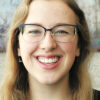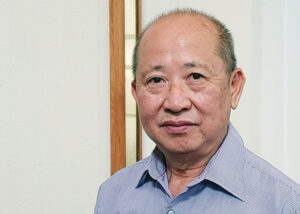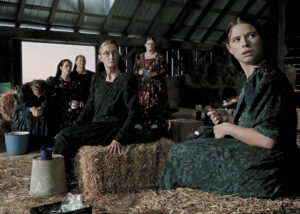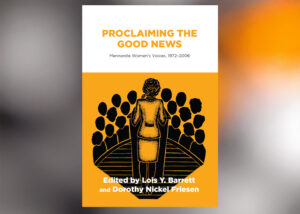It might seem unlikely that young women would be drawn to church leadership and feel compelled to enter pastoral ministry. As young people, they are part of an underrepresented demographic in the church, one that is leaving organized religion in increasing numbers. As women, they have been barred for generations from leadership roles in the church and turned away from the pulpit.
Yet the voices of young female pastors in Manitoba keep surfacing.
“I feel very confident that I feel called to be a pastor, yet I couldn’t tell you exactly what that means or what that looks like,” says Kennedy Froese, associate pastor at Sterling Mennonite Fellowship in Winnipeg. For Froese, part of being called is feeling “a deep love for the church despite all its deep flaws.” Another part is the affirmation of others. “People in my life have told me I have gifts and I should use that deep love to care for the church as a pastor.”
Many young people are not hearing, or heeding, a call like this. Canadian Mennonite University (CMU) is decreasing the number of biblical and theological studies (BTS) courses required for an undergraduate degree and is maintaining a smaller BTS faculty than previous years. Karen Schellenberg, co-director of leadership ministries with Mennonite Church Manitoba, has heard from pastors across the country that many Christian universities are experiencing the same thing.
Selenna Wolfe
“I think our generation needs more of the encouragement from other people, and the voice needs to be louder than it may have been in the past in order for people to hear the call,” says Selenna Wolfe, associate pastor at Hope Mennonite Church in Winnipeg.
The 28-year-old views the concept of calling as “a combination of personal interest and skill and affirmation from others.” She says it’s not necessarily a direct call from God. “I do think God can speak to us, but in my experience it’s more [the] things in life that I think you can interpret as a call from God.”
Her community’s feedback was formative for her own journey to ministry. While studying at CMU, she participated twice in the ministry inquiry retreat. It’s a weekend that brings students interested in ministry together with experienced pastors and CMU faculty for worship, reflection and mentorship. “I felt really affirmed by professors there and their guest speakers,” Wolfe says.
When she was 12 years old, living in Steinbach, Manitoba, Wolfe witnessed the ordination of a female pastor. She remembers thinking, “I’m going to do that one day.”
People continued to remind her of her calling and reaffirm it while she worked at summer camp. She especially loved being the Bible instructor.
Valerie Alipova
External affirmation was also important for Valerie Alipova. While doing a pastoral internship at Bethel Mennonite Church in Winnipeg, a congregant said to her: “I hope I will still be alive to see you be a pastor here one day.” Alipova says, “the calling from my community felt like a divine intervention.”
Alipova, 27, is from Zaporizhzhia, Ukraine. She came to Canada in 2015 for a voluntary service program, staying afterwards for education and then permanently moving here. Growing up, she didn’t think she would be a pastor. Her mom is a lay minister, and like a lot of kids, she didn’t want to follow in the exact same footsteps as her parents. She saw over the years, though, that she had gifts for ministry—leading summer camps, connecting well with people, striving to learn more about faith.
But without community encouragement, she may not have ever explored those gifts as a vocation. “I have a lot of feelings, so I’m not sure I can always trust them all,” Alipova says. “If I didn’t have that support, I’m not sure those feelings [of calling] would have been confirmed because of all the ideas of what the perfect pastor looks like.”
Besides her mother, almost all the pastors she encountered in Ukraine were old men. Even the young pastors, of which there were few, were some version of the idealized male youth pastor who plays guitar. Add to that, moving to Canada with a foreign language and culture, and she didn’t imagine she’d fit as a pastor here.
When Alipova was a student, she was able to use her gifts and test out pastoral ministry through Mennonite Central Committee’s Summerbridge program, an 8- to 12-week opportunity for young adults of diverse cultural backgrounds to do a paid internship in their home congregation. She did the program twice, both times at Bethel. She faced challenges but found the work gave her energy, and she received continual affirmation.
Bethel has a history of having female pastors, Alipova says, and she even got to work on a pastoral team of all women for some of the past several years. It has helped her feel that she deserves to be there. “I see the hard work of women before me that have laid that path for me to enter this position without fighting for my right,” she says.
Kennedy Froese
Froese says her path differs from that of a lot of women. Froese, 28, grew up near Elm Creek, Manitoba, and attended Elm Creek Mennonite Brethren Church. After high school, she attended a Southern Baptist Bible school in Texas. She returned thinking her feelings of being called to ministry must be God giving her a sign not to judge other people’s callings, rather than an actual call for her to go into ministry. “I felt my call when I didn’t think women could be pastoral leaders,” Froese says.
When she returned to Winnipeg, she started attending Fort Garry Mennonite Brethren Church and met Janessa Nayler-Giesbrecht, one of the church’s pastors at the time. Nayler-Giesbrecht invited her to be a youth leader, and the two had long conversations about women in ministry and deconstructing faith.
In the span of a month, each of Froese’s parents asked if she would consider being a pastor, without knowing the other had asked. Then, when Froese made an off-hand comment about not being a pastor to her aunt, her aunt replied, “why not?” Froese says, “That melted my brain. I’d never been asked why I’m not a pastor.”
When she reconnected with the pastor of her home church at a conference, he asked if she wanted to fill an interim pastor position for the summer. She ran the summer youth program and preached her first sermon. “That was the first time I let myself believe I could do it for a job,” she says. She switched from studying library sciences to biblical and theological studies at CMU.
Fear and affirmation
Wolfe says she was scared by stories of other women who felt called to ministry but could not find jobs. Froese and Alipova know stories like this too—a woman who completed her master’s degree and had her gifts affirmed by someone in leadership, only to wait endlessly to hear back, with no result. Another pastor felt a strong calling but had to spend half her lifetime tackling obstacles to get there.
As Wolfe searched for work, prior to landing her role at Hope, her anxiety about struggling as a woman in ministry was further heightened by the fact that she is also queer. “I still felt called, but I felt like the politics of it all would get in the way.” But as the views of more churches shifted, her hopes increased.
Now, she is studying clinical pastoral education to become a chaplain, while pastoring.
Schellenberg is seeing a lot more young women entering ministry in Mennonite Church Manitoba than young men. This is partly because some women pastors from the Mennonite Brethren conference have switched to MC Manitoba.
She has also heard from several middle-aged and older women who felt called when they were young but either dismissed it or did not pursue it because there were no examples to follow. “Some of the barriers have been lifted and people are responding,” she says. “You don’t get uncalled. You can refuse it, but I think you can expect it may come around again.”
In her case, Schellenberg heard the call when she was 40. Her congregation was searching within its own body for someone who could lead. “For me personally it was an almost audible feeling, a nudge from God,” she says. She had already been serving the church in a lot of volunteer pastoral capacities, but this call felt more specific, “like this was definitely mine to do.”
Calling
Froese said she has rarely heard other young people in MC Canada circles use the language of calling, in contrast to her more evangelical circles. Alipova agrees—if a pastor doesn’t connect with their youth individually, they might not hear from youth who are interested in pastoral ministry because they’re too scared or embarrassed to mention it in a group.
Froese speaks freely and deeply about her calling. “My faith and my calling feel very personal, very tied to my experiences of who I am,” she says. “I could cry thinking about the church and that I get to be a pastor.”
For Froese, calling goes beyond reason. “Sometimes I feel like MC Manitoba moves into rational headspace and is uncomfortable with deeply emotional spiritual experiences,” she says. “I like my emotions and that they connect me with God. Calling feels emotional . . . it’s not practical, there’s no logic there . . . but I feel it deeply.”
Not all calling happens this way, nor does it need to. People should be open to all the ways God might call, Schellenberg says. “Maybe that call from God has to come in a way that God knows you will hear it . . . I just think God meets us where we’re at, with our language.”










Leave a Reply
You must be logged in to post a comment.